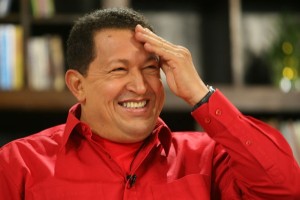Hugo Chávez (Hugo Chávez)

Hugo Chávez
Hugo Rafael Chávez Frías (Spanish pronunciation: [ˈuɣo rafaˈel ˈtʃaβes ˈfɾi.as]; 28 July 1954 – 5 March 2013) was a Venezuelan politician and the President of Venezuela from 1999 until his death in 2013. He was the leader of the Fifth Republic Movement from its foundation in 1997 until 2007, when it merged with several other parties to form the United Socialist Party of Venezuela (PSUV), which he led until 2012.
Born into a working-class family in Sabaneta, Barinas, Chávez became a career military officer, and after becoming dissatisfied with the Venezuelan political system, he founded the secretive Revolutionary Bolivarian Movement-200 (MBR-200) in the early 1980s to work towards overthrowing the government. Chávez led the MBR-200 in an unsuccessful coup d’état against the Democratic Action government of President Carlos Andrés Pérez in 1992, for which he was imprisoned. Released from prison after two years, he founded a socialist political party, the Fifth Republic Movement, and was elected president of Venezuela in 1998. He was re-elected in 2000. During his second presidential term, he introduced the system of Bolivarian Missions, Communal Councils, and worker-managed cooperatives, as well as a program of land reform, while also nationalizing various key industries. He was re-elected in 2006 with over 60% of the vote. After winning his fourth term as president in the October 2012 presidential election, defeating Henrique Capriles,he was to have been sworn in on 10 January 2013, but the National Assembly of Venezuela agreed to postpone the inauguration to allow him time to recover from medical treatment in Cuba, resulting from a return of the cancer that was originally diagnosed in June 2011. Chávez died in Caracas on 5 March 2013 at the age of 58.
Following Chavismo, his own political ideology of Bolivarianism and Socialism of the 21st Century, he focused on implementing social reforms in the country as a part of a social project known as the Bolivarian Revolution. He implemented the 1999 Venezuelan Constitution, participatory democratic councils, the nationalization of several key industries, and increased government funding of health care and education and made significant reductions in poverty with oil revenues. According to the ECLAC, from 1999 to 2012, Venezuela achieved the second highest rate of poverty reduction in the region; with World Bank data showing that the poverty rate dropped from 49.4% to 25.6%. The Bolivarian Missions have entailed the construction of thousands of free medical clinics for the poor, the institution of educational campaigns,and the enactment of housing subsidies.
However, food subsidies and price controls, enacted to ensure access to basic nutrition, resulted in shortages in Venezuela since low profits could not sustain paying for imports, while large purchases of foreign goods and lower reserves contributed to subsequent shortages of dollars necessary for such large imports. Chávez’s presidency also oversaw significant increases in the country’s murder rate,as well as corruption within the police force and government. His use of enabling acts and his government’s use of propaganda was also controversial. Iternationally, Chávez aligned himself with the Marxist-Leninist governments of Fidel and then Raúl Castro in Cuba and the socialist governments of Evo Morales in Bolivia, Rafael Correa in Ecuador, and Daniel Ortega in Nicaragua, his presidency was seen as a part of the socialist “pink tide” sweeping Latin America. Along with these governments, Chávez described his policies as anti-imperialist, being a prominent adversary of the United States‘s foreign policy as well as a vocal critic of US-supported neoliberalism and laissez-faire capitalism. He compared US president George W. Bush to a donkey and the devil. He has described himself as a Marxist. He supported Latin American and Caribbean cooperation and was instrumental in setting up the pan-regional Union of South American Nations, the Bolivarian Alliance for the Americas, the Bank of the South, and the regional television network TeleSur.
On 5 March 2013, Vice President Nicolás Maduro announced on state television that Chávez had died in a military hospital in Caracas at 16:25 VET (20:55 UTC). The Vice President said Chávez died “after battling a tough illness for nearly two years.” According to the head of Venezuela’s presidential guard, Chávez died from a massive heart attack, and his cancer was very advanced when he died. Gen. Jose Ornella said that near the end of his life Chávez could not speak aloud, but mouthed his last words: “Yo no quiero morir, por favor no me dejen morir” (I don’t want to die. Please don’t let me die). The funeral was planned to be held in Caracas. Chávez is survived by four children and four grandchildren.
Vice President Maduro and Chávez’s supporters had suggested foul play was behind Chávez’s illness and death. Maduro speculated that Chávez had been poisoned or infected by enemies, and expressed a belief that the claim could someday be tested scientifically. It was unclear whether Maduro was referring to Chávez’ cancer, or his respiratory infection. During the same address, Maduro announced the expulsion of an attaché to the U.S. embassy for what he called “a plot against the government” of Venezuela. Chávez himself had claimed to be “a victim of U.S. assassination attempts.” The U.S. Department of State dismissed the allegation as “absurd”. Argentine doctor Eduardo Cazap dismissed Venezuelan claims of the existence of a cancer-inducing weapon by quoting: “Our body is extremely resistant to all the factors that could affect it. And when you need to produce cancer in an experimental manner you need to use huge amounts of drugs or huge amounts of toxins”.
His death triggered a constitutional requirement that a presidential election be called within 30 days. Chavez’s Vice President, Maduro, was elected president on April 14, 2013.
Born
- July, 28, 1954
- Sabaneta, Barinas
Died
- March, 05, 2013
- Caracas, Venezuela
Cemetery
- El Museo Histórico Militar de
- Caracas Capital District, Venezuela
Other
- Glass tomb for perpetual public viewing



